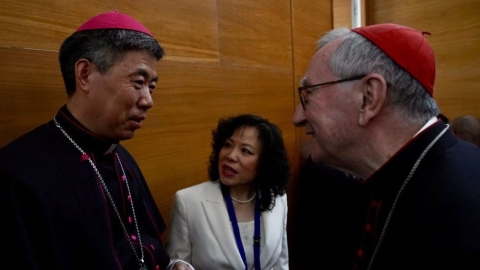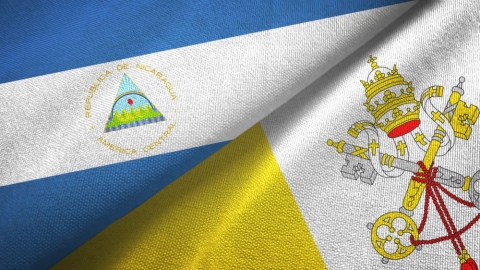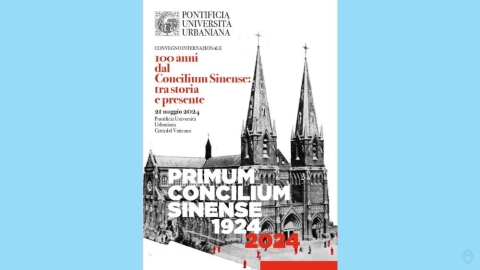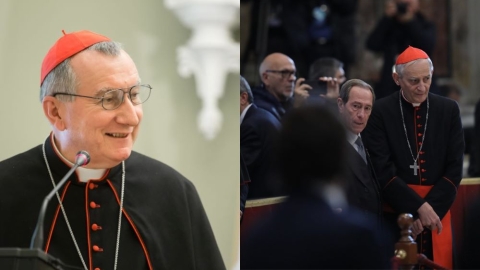Vatican Trial of the Century: Epilogue

Judge Giuseppe Pignatone during the verdict reading of the Vatican trial
On December 16, 2023, the criminal court of the Vatican City State gave its verdict on the embezzlement case against Cardinal Angelo Maria Becciu, former substitute for General Affairs of the Secretariat of State, who was formerly one of the most influential figures in the Roman Curia. Historic prison sentences were delivered.
This resounding trial took more than two years, spanning 85 hearings, to write the epilogue of the epic investigation led by the Vatican into the fraudulent purchase, by the Secretariat of State, of a luxury London building, for the tidy sum of 350 million euros between 2014 and 2018.
It was a more than doubtful financial transaction which was in part settled with money from funds managed by Peter’s Pence—that is to say, the donations of the faithful which flow in each year from all over the world. The accused, for their part, always maintained that their actions were legal and that the highest Vatican authorities were aware.
Related Article:
The First Cardinal to Appear Before the Vatican Criminal Court
In the afternoon of December 16, 2023, Giuseppe Pignatone gave a long-awaited verdict, sentencing Cardinal Angelo Becciu for “crime and embezzlement” and “violation of the regulations for the management of ecclesiastic goods” to five and a half years in prison: a historic first in the Church, which will certainly be much written about.
The cardinal was also fined 8,000 euros and permanently banned from exercising public office. The Promoter of Justice had required a sentence of seven years and three months of prison and a fine of more than 10,000 euros. Cardinal Becciu’s lawyer, Fabio Vignone, commented: “We respect the verdict, but we will certainly file an appeal.”
Brokers Gianluigi Torzi and Raffaele Mincione, former official Fabrizio Tirabassi, and Enrico Crasso, former financial advisor to the Secretariat of State, received sentences ranging from five to seven years in prison. Cecilia Marogna was sentenced to three years in prison. René Brühlart and Tommaso Di Ruzza were only fined, and Msgr. Mauro Carlino was acquitted.
Giuseppe Pignatone’s mission ends with this verdict: this high Italian magistrate, who fought against the mafia throughout his whole career, had been pulled out of retirement by Pope Francis, who personally wanted this trial to show his determination to act against corruption in the Vatican. It was, as he himself admitted, one of the princpal objectives that the electors of the conclave of 2013 had set for him.
Beyond these convictions, the general impression that will remain is one of a trial which quickly turned into a Pandora’s box from which revelations emerged on the “vendetta” climate and on the laxity of business management: enough to cause certain damage to the reputation of the Holy See and to its diplomatic services.
And that is not to mention the “trial within the trial” which quickly took hold, with some lawyers denouncing several aspects of the Holy See’s criminal procedure that were deemed “incoherent” and pointing the finger at the legitimacy of the decrees signed by the Pope before the first hearing, in order, for example, to be able to judge a cardinal, giving an impression of strengthening the accusation at the expense of the defense.
It remains to be seen whether the Argentinian Pontiff, who celebrated his 87th birthday the day after the verdict, will be lenient in order to lighten the sentences of the condemned and if Cardinal Becciu will one day regain his place within the Sacred College.
The conclusion of the resounding Vatican trial is undoubtedly historic. Even if everything is not clear, either in terms of the procedure or in terms of the course of the trial itself, the message is abundantly clear for all: no one is out of reach behind the leonine walls.
Related Article:
(Sources : Le Figaro/Associated Press/Le Monde/Vatican News – FSSPX.Actualités)
Illustration : Banque d'images Alamy





